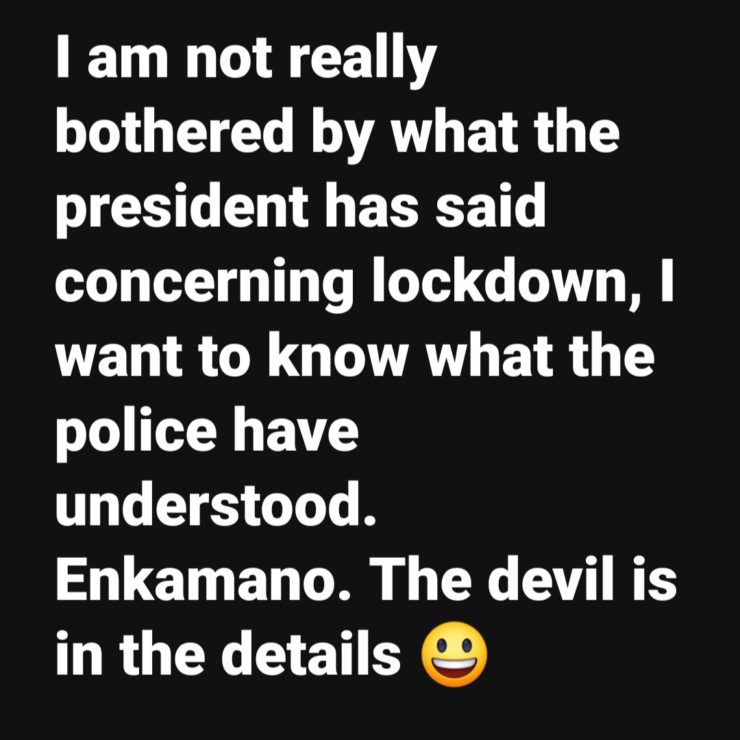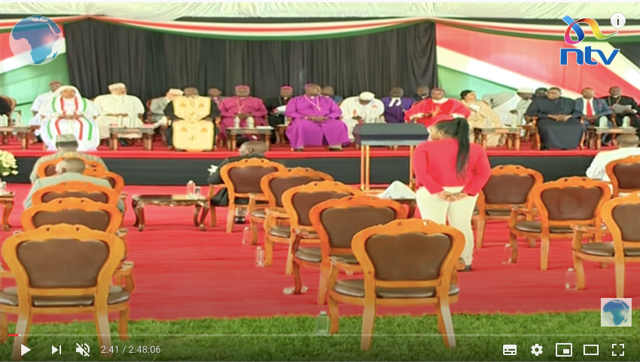Erik Meinema
‘Quarantine is Godly’, but in the fight against Corona, ‘the Devil is in the details’: Spiritual danger, disease, and the Kenyan nation
As a dangerous entity of which the movement and spread often remains invisible, Corona has triggered a sense of insecurity amongst many. In an effort to come to terms with this danger, state officials and other public institutions have not only developed a ‘pandemic lingua franca’ to build coherence and make sense of Corona, but also drawn upon terms and metaphors which do not necessarily find their origin in the medical sphere. For example, the metaphor of war has become a major trope through which political leaders across the globe speak about the Corona-crisis and their efforts to contain it. Given our desire to grasp mysterious dangers through recognizable terms that make them comprehensible, it is perhaps unsurprising that many people have also understood Corona through spiritual terms. For example, in different parts of the world, politicians and religious leaders have drawn upon the Pentecostal language of ‘spiritual warfare’ to present the coronavirus as a demonic evil or harmful spiritual power, which requires spiritual remedies such as prayer or faith healing to be overcome. This ‘spiritualization’ of Corona has raised extensive debates about whether and how religion should inform efforts to deal with the Corona-crisis, as well as lively debates about the relations between religion and science. In these debates, a common line of reasoning has been that public policies should prioritize science over religion, with criticisms focusing on religious leaders who defy public health measures such as social distancing by encouraging their followers to put their faith in divine intervention instead.
Similar debates have figured in the Kenyan context, where on March 21 of this year, president Uhuru Kenyatta organised a national prayer meeting in relation to the Corona-crisis. During the prayer meeting, various Christian, Muslim, and Hindu leaders joined high-ranking government representatives, military officials, and president Kenyatta for a two-hour long prayer meeting. At the event, politicians as well as Muslim and Christian leaders emphasized the need to turn to God in prayer during times of national emergency. For example, President Kenyatta called on citizens to ‘seek God’s forgiveness for anything that we may have done wrong individually and collectively as a nation, and seek His favour on the challenges we are facing’. Anglican Archbishop Jackson Ole Sapit similarly associated Corona with the sins of the Kenyan nation, by arguing that ‘it is time the nation shuns corruption, negative ethnicity and immorality’. Muslim leaders also emphasized the importance of national unity, and emphasized that Kenyans should come together as ‘brothers and sisters in humanity’, and ask God for forgiveness for ‘the sin of hate between us […] and tribalism within our country’ (dhambi ya chuki baina yetu […] na ukabila katika nchi yetu). Thus, while fears for Corona has in several contexts led to xenophobia with regard to outsiders who are suspected of transmitting the disease, during the national prayer event in Kenya, political and religious leaders rather suggest that collective sins such as tribalism and internal divisions are related to the presence of Corona in Kenya. In this way, the national prayer event builds on broader trends in Kenya, in which religion is mobilized to promote peace and national unity, and to rally citizens of different ethnic and religious backgrounds behind the leadership of ruling political elites in face of spiritual danger.
Similar to other contexts, the national prayer meeting in Kenya provoked criticism from political commentators and scholars. For example, US-based law professor of Kenyan origins Makau Mutua argued that ‘prayers will not help Kenya combat the virus’, and that the Kenyan government should focus on science in its efforts to counter the spread of the virus instead. Similarly, Kenyan scholar Damaris Parsitau has argued that science and medicine offer ‘more reliable solutions’ to global pandemics than a focus on prayer alone. According to Parsitau, the focus on prayer during the national prayer event is used to divert attention away from profound economic and political inequalities within Kenyan society, which hinder an effective response to Corona and have left many Kenyans in dehumanizing conditions during the crisis.
The criticism of Parsitau that Kenyan political elites draw upon religion to cover up their shortcomings is well taken, since years of corruption and bad governance have left the Kenyan health system dangerously incapable of providing adequate care to all except the privileged few. Yet, Parsitau also acknowledges that science and faith do not necessarily contradict each other. Indeed, it is important to stress that many Kenyans conceive religion and science to be compatible when it comes to battling Corona. For example, former chief justice Willy Mutunga responded to Makau’s call to public officials to turn to science by asking whether there is ‘anything wrong with the integration of prayers and science?’. Mutunga went on to propose a combination of science, Christianity, and Kamba spirituality in response to Corona, since we must ‘use all scientific and religious arrows in our quiver’. Attitudes which point towards the integration of science and religion where also demonstrated during the national prayer event itself, where the seats of participating religious and state officials were amply spaced to keep social distancing, while speakers all used separate microphones to limit the risk of contagion. Furthermore, while some Muslims and Christians in Kenya have continued to congregate despite a government ban on public gatherings which does not exempt places of worship, it seems that most churches and mosques largely follow government regulations by closing their premises for meetings and gatherings, and have started to organize online alternatives instead.
The proposal of Mutunga to draw upon both religion and science in response to the coronavirus resonates with ways in which many Kenyans speak about Corona on online platforms. During extensive fieldwork in the coastal Kenyan town of Malindi, I joined several informal groups on Whatsapp and Facebook, which form important media through which people inform themselves and others about current events within the town and its surroundings. While following discussions about Corona on these platforms, I noticed that people often use online groups to encourage each other to trust in God in these troublesome times. Yet, these groups are also used to stress the importance of social distancing and sanitary measures to protect one another from the virus. For example, in an online group in which youth in Malindi inform themselves about political and social events that affect them, one young woman encouraged fellow group members to stay home as much as possible by posting the following message:
‘Ignorance kills, be calm and follow the rules… this is not because of our president or the leaders we elected, but you, me, our families. Think about the future. Quarantine is Godly. Pray and believe it’s coming to an end’.
Crucially, in this message, religious language is not invoked to encourage people to put their faith in divine intervention alone, or to rally support for ruling political elites. Rather, religious language is invoked here to remind people of their ‘Godly’ duty to protect themselves and their families from disease by quarantining themselves. This means that the spiritualization of Corona by praying for divine intervention does not necessarily mean that people disregard the importance of ‘scientific’ measures such as washing hands to limit the spread of contagious diseases such as COVID-19.
I also noticed how religious language commonly features in Facebook groups which are used by residents of Malindi to mobilize material support for those in need, the activities of which have continued during the Corona-crisis. Within these groups, participants from different religious backgrounds often remind each other of the importance of measures such as social distancing and washing hands to minimize the spread of the coronavirus. Furthermore, through these online platforms, people identify needy individuals and families, for which funds are mobilized via small donations which are usually channelled through m-pesa, a mobile phone based money transfer service developed in Kenya. These funds are used to provide material support in the form of basic necessities, such as soap and sanitary pads, or food packages to support needy Muslim families during Ramadhan. The delivery of support to beneficiaries by group members who wear face masks and keep to social distancing is subsequently reported within the same online spaces in which funds were raised. To such posts, both Christian and Muslim group members usually respond by asking God to bless or reward those who have made the effort of helping others, through phrases such as ‘may God bless them’ (Mungu awabariki) or ‘may God give them a long life’ (Allah awape maisha marefu). Again, religious language is invoked here not so much to rally citizens behind political elites or to divert attention away from medically oriented public health measures, but to foster an attitude of care and responsibility towards those in need.
Finally, as much as political elites emphasize the importance of national unity in times of emergency, many Kenyans seem to be well aware that the Corona-crisis has laid bare profound economic and political inequalities within Kenyan society. For several weeks already, Kenya has implemented measures such as a nation-wide curfew which prohibits outdoor movements between 7pm and 5am, and sanitary directives for operatives who work in the public transport sector. Ever since these measures were implemented, online platforms have regularly featured videos and reports about police officers who use extreme violence or demand bribes while enforcing regulations, and cases of police brutality during which little care seems to be taken to prevent the spread of the virus. Others posts have accused political elites of implementing Corona-related measures and aid provision in ways that align with their own economic or political interests, instead of protecting public health and safety. Commentators have also pointed out that strict adherence to Corona-related government regulations is a luxury that many Kenyans are unable to afford, since they do not have access to running water for regular sanitation or adequate housing to quarantine themselves. Many are also unable to obey calls for social distancing because this would cut them off from the informal economic activities through which they earn money for food on a day-to-day basis.
Under these conditions, participants in online platforms have turned to both religious and medical metaphors to comprehend and critique the highly vulnerable situation they find themselves in during times of Corona. For example, a member of a Facebook group which is frequently used for political debates reacted to a video that depicts police officers demanding bribes by arguing that ‘corruption is another Covid 19’ which requires anti-corruption measures to be taken to ‘sanitize’ and ‘eradicate’ it. In another Facebook group, one member responded to a post about police brutality by arguing that ‘Before corona Kenya was already sick’. In a Whatsapp group through which youth inform themselves about Corona, a young woman compared the problem of hunger to Corona, by arguing that ‘hunger is another pandemic’ which demands solidarity from ‘the rich’, so that ‘the poor’ can also protect themselves. In the same Whatsapp group, participants discussed a speech delivered by president Kenyatta, in which he introduced the partial lockdown measures taken by the Kenyan government. As part of the discussion, one participant posted an image with the following text:
‘I am not really bothered by what the president has said concerning lockdown, I want to know what the police have understood. Enkamano. The devil is in the details’.

This music video, which was posted on YouTube by music collective Afrogunda, also draws upon religious language to criticize the problem of police violence. In the video, artist Victoria Saher repeats the lyrics of the opening stanza of the Kenyan national anthem, from which the title of the song, ‘haki iwe ngao’ (justice be a shield), is derived. The stanza starts with an appeal to God, who is recognized as a provider of strength and blessing (ee Mungu nguvu yetu, ilete baraka kwetu). This line is followed by the recognition that justice must be a shield and protector (haki iwe ngao na mlinzi), so that Kenyans can prosper in freedom and peace (amani, uhuru, raha tupate na ustawi). Through the repetition of these lines within the context of a music video in which other artists decry police brutality, Victoria Saher seems to suggest that God’s strength and blessing for Kenya only come to full fruition when security agencies defend and respect the rights of all.
Through such posts, various commentators arguably draw upon both religious and medical metaphors to emphasize how not only Corona itself, but also police violence, hunger, and corruption threaten the health and spiritual integrity of the Kenyan nation, in ways that expose less privileged Kenyans to hardship and danger. These observations suggest that during the Corona-crisis in Kenya, both religious and medical language is used to support different positions and political agendas, in ways that complicate simple juxtapositions between religion and science. Rather, the use of religious and medical metaphors arguable enables people to diagnose the endangered “body” of the Kenyan nation in a variety of ways, and to propose remedies that align with their varying socio-economic positions and political interests.
This blog is a part of ‘Dossier Corona’, introduced by Religious Matters in the spring of 2020.


